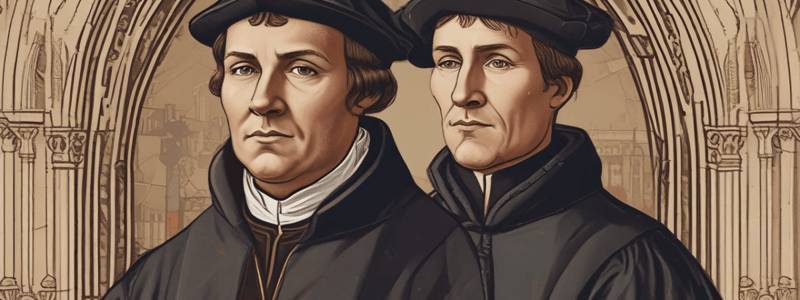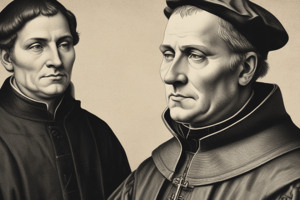Podcast
Questions and Answers
Dante's Purgatorio is a story about people's lives on earth.
Dante's Purgatorio is a story about people's lives on earth.
False (B)
The concept of Purgatory originated in the Middle Ages.
The concept of Purgatory originated in the Middle Ages.
False (B)
The Treasury of Merits was established by Sixtus IV.
The Treasury of Merits was established by Sixtus IV.
False (B)
The Treasury of Merits is a concept where saints earn salvation only for themselves.
The Treasury of Merits is a concept where saints earn salvation only for themselves.
Luther initially intended to reform the Catholic Church.
Luther initially intended to reform the Catholic Church.
Papal encyclicals are always short and concise.
Papal encyclicals are always short and concise.
Luther saw the Pope as the head of the Catholic Church in 1517.
Luther saw the Pope as the head of the Catholic Church in 1517.
The Catholic Church has never had a system of indulgences linked to Purgatory.
The Catholic Church has never had a system of indulgences linked to Purgatory.
Luther was against indulgences due to their pastoral impact.
Luther was against indulgences due to their pastoral impact.
Purgatory is a place of eternal suffering.
Purgatory is a place of eternal suffering.
Salvator Nostra is a papal bull written by Clement VI.
Salvator Nostra is a papal bull written by Clement VI.
The bull of excommunication was issued in 1517.
The bull of excommunication was issued in 1517.
Luther was a strong supporter of the Pope in 1517.
Luther was a strong supporter of the Pope in 1517.
Luther's opposition to the papacy started in 1517.
Luther's opposition to the papacy started in 1517.
Luther saw the 1517 event as an attempt to overthrow the papacy.
Luther saw the 1517 event as an attempt to overthrow the papacy.
Luther's Christian Liberty had negative views about the Pope.
Luther's Christian Liberty had negative views about the Pope.
The title "Laetitia Amoris" translates to "the joy of love" in English.
The title "Laetitia Amoris" translates to "the joy of love" in English.
Salvator Nostra links the treasury of merits to heaven.
Salvator Nostra links the treasury of merits to heaven.
Indulgences are certificates that guarantee entrance to heaven.
Indulgences are certificates that guarantee entrance to heaven.
The papacy at the beginning of the 16th century was financially stable.
The papacy at the beginning of the 16th century was financially stable.
Michelangelo was hired to decorate the Vatican cheaply.
Michelangelo was hired to decorate the Vatican cheaply.
The text mentions that there was no debate within the church about indulgences in the early 16th century.
The text mentions that there was no debate within the church about indulgences in the early 16th century.
The treasury of merits is linked to the concept of indulgences.
The treasury of merits is linked to the concept of indulgences.
The text states that indulgences were only sold to the wealthy.
The text states that indulgences were only sold to the wealthy.
The split between Protestants and Catholics was a foregone conclusion in 1517.
The split between Protestants and Catholics was a foregone conclusion in 1517.
Chris Castaldo is a Catholic priest.
Chris Castaldo is a Catholic priest.
The Council of Trent led to a genuine attempt to reconcile Protestants and Catholics on the issue of justification.
The Council of Trent led to a genuine attempt to reconcile Protestants and Catholics on the issue of justification.
Luther's nailing of the 95 theses to the castle door was a radical action on his part.
Luther's nailing of the 95 theses to the castle door was a radical action on his part.
There was no attempt to reconcile Protestants and Catholics on the issue of justification before the Council of Trent.
There was no attempt to reconcile Protestants and Catholics on the issue of justification before the Council of Trent.
The Reformist Catholics did not genuinely want to hear what the Protestants were saying and find common ground for agreement.
The Reformist Catholics did not genuinely want to hear what the Protestants were saying and find common ground for agreement.
The Council of Trent was held in 1517.
The Council of Trent was held in 1517.
Luther's action of nailing the 95 theses to the castle door marked the beginning of the end of the Protestant-Catholic split.
Luther's action of nailing the 95 theses to the castle door marked the beginning of the end of the Protestant-Catholic split.
In the 16th century, the Catholic Church had a clear, dogmatically defined position on justification.
In the 16th century, the Catholic Church had a clear, dogmatically defined position on justification.
The Pope was clear about the meaning of indulgences in the early 16th century.
The Pope was clear about the meaning of indulgences in the early 16th century.
Luther initially opposed indulgences due to their theological implications.
Luther initially opposed indulgences due to their theological implications.
The Catholic Church was highly organized and effective in communication during the 16th century.
The Catholic Church was highly organized and effective in communication during the 16th century.
Tetzel's jingles were used to promote the importance of humility in the Catholic Church.
Tetzel's jingles were used to promote the importance of humility in the Catholic Church.
Luther's concerns about indulgences were primarily focused on their financial implications.
Luther's concerns about indulgences were primarily focused on their financial implications.
The Catholic Church had a clear understanding of Purgatory during the 16th century.
The Catholic Church had a clear understanding of Purgatory during the 16th century.
Luther's 95 Theses Against Indulgences was a rejection of the Catholic Church's teachings on indulgences.
Luther's 95 Theses Against Indulgences was a rejection of the Catholic Church's teachings on indulgences.
Flashcards are hidden until you start studying
Study Notes
Purgatory and Indulgences
- Purgatory emerges in the early church as a place where people go to be cleaned up before they go to heaven
- In the Middle Ages, Purgatory becomes linked to the penitential system, allowing penance done on earth to have an impact on Purgatory in the hereafter
Treasury of Merits
- The Treasury of Merits is established by Clement VI, where certain individuals (saints) produce a surplus of merits beyond what is needed for their own salvation
- This surplus is held by the church in a sort of cosmic bank account, to be used to aid others in Purgatory
Luther and Indulgences
- Luther nails the 95 Theses to the castle door in 1517, calling for a debate on indulgences
- Luther's opposition to the papacy grows over time, but he does not initially intend to overthrow the papacy
- Luther is not heretical on justification, as the church has no defined position on it at the time
- Luther's main concern is the theological implications of indulgences, not the indulgences themselves
Indulgences and the Papacy
- An indulgence is a certificate that grants a certain period of time out of Purgatory in exchange for a cash transaction
- The papacy is financially struggling in the early 16th century, and indulgences become a means of raising revenue
- The papacy hires expensive interior decorators, including Michelangelo, to work on the Vatican
The Reformation and the Council of Trent
- The Reformation leads to a split between Protestants and Catholics, with attempts at reconciliation in the early years
- The Council of Trent (1540s) marks a turning point, solidifying the divide between Protestants and Catholics
- Until the early 1540s, there were attempts at genuine agreement and reconciliation between the two sides
Studying That Suits You
Use AI to generate personalized quizzes and flashcards to suit your learning preferences.




